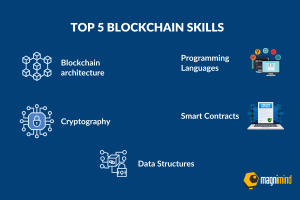Many companies have started adopting Blockchain in the past decade to reap its benefits. Blockchain is innovating the way companies perform their various operations. If you aspire to learn Blockchain, it’s the perfect time to become an early adopter and start learning Blockchain. If you acquire this rapidly growing technology now, you’ll already be way ahead of the competition in the future when Blockchain replaces most of the traditional technology. If you want to get into it, this article is a complete guide to top 5 skills required to become a Blockchain developer. Before talking about the skills, let’s briefly understand what a blockchain developer is.
What Is a Blockchain Developer?
Blockchain development involves creating a decentralized, tamper-proof database for securing transactions and other records. A Blockchain developer develops apps on blockchain protocol architecture; they operate, optimize and improve blockchain protocols. They also develop smart contracts.
There are two types of blockchain developers.
- Blockchain software developers develop software based on Blockchain. They are front-end and back-end developers of decentralized apps of Dapps. They also supervise and stack Dapps.
- Core Blockchain developers design the architecture and protocols of Blockchain. They are responsible for monitoring the blockchain network and keeping it safe.
Skills Required to Become a Blockchain Developer

Top 5 Blockchain Skills
To become a blockchain developer you need to learn the following skills.
Blockchain architecture
A blockchain developer should know about Blockchain and how it works. He must have a clear understanding of consensus mechanisms and cryptographic functions.
Blockchain developers must learn about how DLTs(Distributed Ledger Technologies) operate. Mastery of blockchain architecture is a must-have skill for you if you aspire to become a blockchain developer.
There are three types of blockchain architecture:
- Public Blockchain architecture is completely decentralized. It is accessible to everyone, and anyone can be a part of it. Bitcoin is the most common example.
- Private Blockchain architectures are accessible only to an authorized group of individuals. They are mostly used by private organizations.
- Consortium Blockchain architectures aren’t completely decentralized. They are controlled by a group of organizations. The Energy Web Foundation is an example.
You should be familiar with all the different types of architecture. Developing an app on Ethereum won’t be the same as building applications on Ripple due to variations in consensus mechanisms, smart contract languages, and use cases.
Cryptography
Cryptography studies protocols that encrypt the data stored on a blockchain network. Each block of information in a blockchain network is linked to the ones before and after it with a unique cryptographic hash. This prevents malicious third parties from accessing the data stored on a blockchain.
Learning cryptography is crucial for a blockchain developer as this forms the basis of the security of Blockchain. Blockchain technology uses public and private keys to encrypt and decrypt data.
As a developer of a blockchain network, you must be able to manage these keys and ensure that only authorized persons have access to them. You must also know how to use digital signatures to prevent data from tampering.
Security should be at the forefront of a blockchain developer, and cryptography forms the foundation of blockchain technology.
Programming Languages
To become a blockchain developer, you must learn programming languages like C, Python, Javascript, Ruby, Golang, etc. Programming languages are the basis of all the applications and architecture of Blockchain.
Java has been used to create a cryptocurrency NEM. C++ is a must-have. It was the language that was used to create Bitcoin. To become a blockchain developer, Javascript, Ruby, and C# are essential.
Solidity is a programming language specifically designed to develop smart contracts on Ethereum. Other programming languages are not specific to a network type and can be used for several blockchain development purposes.
Smart Contracts
Smart contracts are an application of Blockchain that allows businesses and organizations to exchange goods or services without the involvement of a third party. These contracts are stored on the Blockchain and are executed automatically when a predetermined set of conditions are set. They do not require the approval of an authority. Smart contracts are faster and more time efficient than traditional methods.
A blockchain developer is responsible for planning and executing smart contracts as intended. As blockchain technology evolves, various businesses are widely utilizing smart contracts. New use cases of smart contracts will likely arise which means that the demand for blockchain developers will increase.
Some programming languages are specifically associated with the development of smart contracts. They include chain code and viper etc.
Data Structures
Blockchain developers work with various data structures regularly. These data structures are used to build and implement networks. Blockchain relies on complex data structures to create blocks of information that store data.
A blockchain developer must comprehensively understand data structures such as hash tables, liked lists, binary trees, and graphs.
A blockchain developer should be able to write algorithms for different processes like confirming balances, validating transactions and verifying digital signatures. To perform these functions like a senior developer, a strong understanding of data structures and their applications is needed.
Besides these core 5 skills, it is a big plus to have knowledge of web development as many blockchain applications are web-based. Finally, just like in many IT jobs soft skills like problem-solving, teamwork, effective communication are essential for a blockchain developer.
Conclusion
Five core skills, blockchain architecture, cryptography, programming languages, smart contracts and data structures are required to become a blockchain developer.
Acquiring these skills allow blockchain developers to create secure, decentralized networks that store transaction records and other information.
Aspiring blockchain developers must hone these 5 skills to step into this cutting-edge technology.



